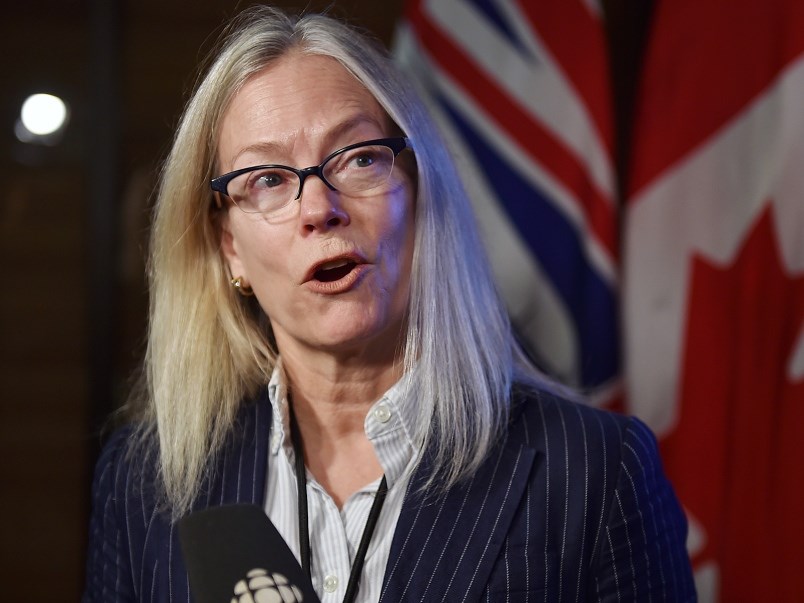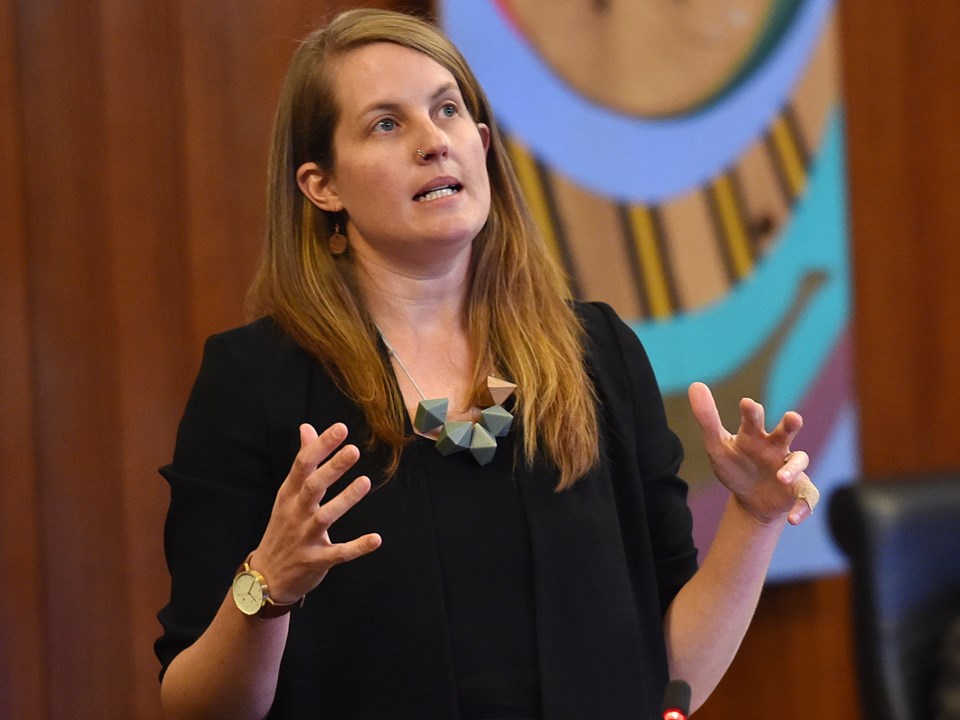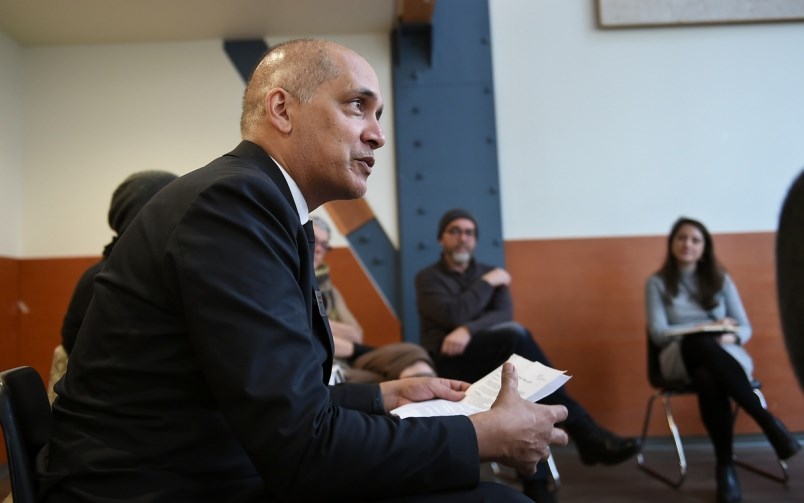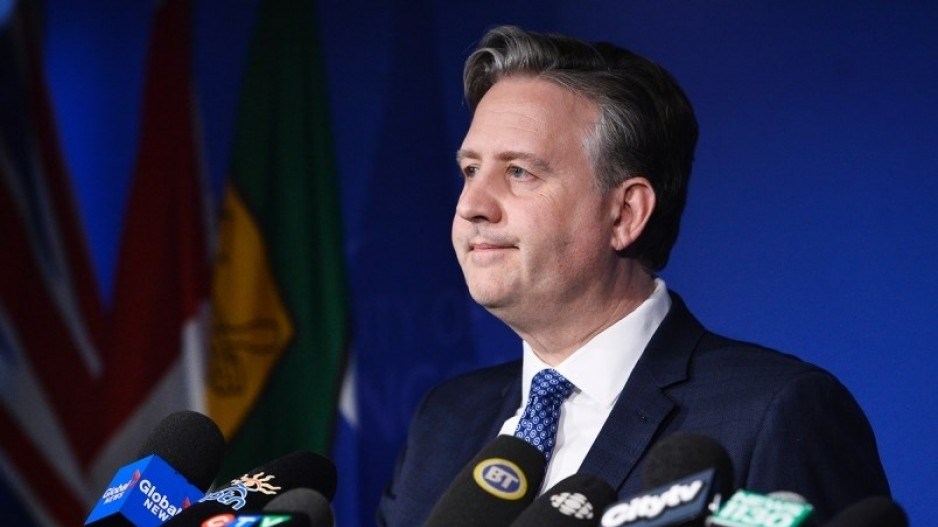The pushback from a coalition of councillors representing the NPA, the Greens and the independent Rebecca Bligh served as a devastating blow to Stewart, whose normally diplomatic approach to collaboration was replaced by pointed comments at council’s refusal to move ahead with his proposal.
“I’m flabbergasted that we would delay this,” said Stewart, describing the vote as a “defining moment” in council’s four-year term.
“I think it’s a huge mistake. It sends the wrong signal. If we can’t even get a pilot project off the ground, how can anybody have any faith we’re going to do anything to help those who are not afforded the opportunities [in this city]?”
After almost four hours of debate, council voted 7-2 to refer a heavily amended and wider-scoped motion — which removed the immediacy and many specifics of Stewart’s “Making Home” proposal — to city staff for further consideration.
A report is not due back to council until sometime after May 2021.
NPA Coun. Melissa De Genova, who chaired the meeting, and COPE Coun. Jean Swanson abstained from voting, although Swanson made it clear in earlier remarks that she was concerned about focusing a housing program on middle-income earners instead of households who earn $50,000 per year, or less.
Councillors who voted to refer the motion based their decisions on wanting more evidence on how the mayor’s plan would work, how it would fit with the ongoing city-wide Vancouver Plan discussions, the need for public feedback and more housing data.
 NPA Coun. Colleen Hardwick. File photo Dan Toulgoet
NPA Coun. Colleen Hardwick. File photo Dan Toulgoet“That’s not what we’re doing. We keep talking about emergencies and crises without actually having the real data to be able to do that analysis, and then come up with appropriate plans going forward.”
Stewart rolled out his Making Home proposal to reporters two weeks ago and received considerable media coverage. His plan garnered positive feedback from Evan Siddall, the head of the Canada Mortgage and Housing Corporation, and representatives of Small Housing BC.
Under the plan, owners of single-family homes could convert or redevelop a single detached house into multiple homes, keep one for themselves or other family members, and sell the remaining homes to middle-income earners.
The number of homes would depend on what an owner wants and what the city would allow, but at least one or more of the homes would have to be sold to a household in the $80,000 to $120,000 income bracket.
Stewart called for an experiment, or pilot project, to have 100 homeowners across the city participate in what he argued was a plan to bring more affordability to Vancouver, where owning a home is out of reach for a great majority of people.
He suggested such a move would dampen market speculation — a covenant would be placed on the affordable homes when or if re-sold — and respond to concerns over climate change, with more people living on a smaller footprint.
The mayor’s strategy to have his plan studied by city staff — and eventually approved by council — was to add it to a motion the NPA’s Dominato introduced previously in the summer.
Dominato called for “creative and experimental” ground-oriented housing in single-family housing zones that would be suitable and affordable for a wider spectrum of Vancouver families.
Her motion was at the core of the debate Tuesday, with the mayor first introducing his proposal in the form of an amendment, only to have councillor after councillor add their own amendments, including pushing a pilot project to “promote the construction of affordable homes for working and middle-income households” to late next year.
Stewart suggested a pilot — whatever form it takes — wouldn’t occur until “maybe 2022” and possibly beyond the next election set for October of that year. He reiterated several times that his plan was an experiment, which would first have to be reviewed by staff and go before the public — and that it would only involve 100 homes in a city of 68,000 single-family home lots.
 OneCity Coun. Christine Boyle. File photo Dan Toulgoet
OneCity Coun. Christine Boyle. File photo Dan ToulgoetOneCity Coun. Christine Boyle was the lone councillor to support the mayor’s proposal, expressing her disappointment that a referral motion wasn’t introduced until three hours into Tuesday’s debate.
“This referral motion feels like it’s coming a bit out of left field after many hours of many councillors bringing amendments forward and working together,” Boyle said.
“It’s worth being clear that this will absolutely delay tangible action on this front. We’ve heard staff say that there is plenty of work to do in shaping this pilot. And adding it to a much larger project means that work won’t get started anytime soon.”
That “larger project” is outlined in the final motion, which is wide in scope and requests staff to:
• Determine the feasibility of including market and below-market rental options.
• Consider increasing height allowance of homes to allow for fully accessible ground-floor units.
• Reduce “embodied emissions” and costs of digging deep basements.
• Consult with the “community housing sector” to explore what role they could play in managing the affordable homes.
• Provide for retention or renewal of trees on private property.
• Exclude properties for which development would result in the loss of current rental units or homes with heritage or character home designation.
• Encourage incentives to encourage “deeper affordability” by relaxing parking requirements, design, floor space ratio and other city regulations.
Those requests are in addition to staff being asked to consider additional density for housing options along arterials and transit hubs — and for the concepts in the motion to be included in the “complete neighbourhoods” public sessions scheduled this fall as part of the Vancouver Plan.
Added Boyle: “This council is earning a reputation for spending a lot of time getting very little done, and I’m finding it increasingly frustrating, particularly because we know that more than 800 detached homes per year are being torn down and replaced with newer, luxury detached homes. This proposal in front of us is a very modest pilot project to test out some ideas. I don’t think it’s perfect, but I think that we should try something.”
Green Party Coun. Adriane Carr agreed with the mayor that “this is a defining moment” for council but rejected his position that referring a wider motion to staff could be described as a delay in his plan.
“This is about whether this council wants to hear from the residents of this city and hear from them on issues of primary concern to them, which is the affordability of housing and the desire to have affordable housing in every neighbourhood in this city,” Carr said.
“We have a process going on right now with the Vancouver Plan and an opportunity to use that process — which we know is coming down right away —to have a more neighbourhood-based discussion with the public, and bring forward their ideas.”
Carr’s comments echoed the position put forward by Larry Benge, the co-chair of the Coalition of Vancouver Neighbourhoods, who emphasized to council the need for discussion at the neighbourhood level.
Benge acknowledged the need for more innovative affordable housing options in the city but argued the mayor’s plan would create more unaffordability, increase speculation in the market and cause more demolition of houses.
“It’s a broad-brush stroke, top-down approach from the city to impose zoning on the entirety of the city,” Benge said. “The mayor’s proposal came out of the blue, and the mayor seems to be pedaling divisiveness through his personal campaign for this amendment.”
Stuart Smith, a board member with Abundant Housing Vancouver, spoke in favour of the mayor’s proposal, saying he welcomed the pilot project aspect of it, noting it was a way of “showing people that things can happen without destroying the universe.”
“The housing crisis is not an abstract problem, it’s not a word we should surround with air quotes, and it’s not something we can take our time solving,” Smith said.
“There’s a real human cost to a lack of available affordable housing, and it’s important that the city continues its work to increase the amount of available and affordable housing while the longer term planning processes are happening in the background.”
 Green Party Coun. Pete Fry. File photo Dan Toulgoet
Green Party Coun. Pete Fry. File photo Dan ToulgoetGreen Party Coun. Pete Fry criticized council for “Frankensteining” the eventual final motion with amendment after amendment, saying the process was deeply flawed.
But Fry said he supported a referral to staff and described it as “a reasonable move,” adding that he didn’t think the mayor’s plan was “dead in the water,” but that more questions needed to be answered.
“I want to know where this is going to land in our city, I want to know if this is going to displace affordable rental housing in parts of East Vancouver…I want to make sure that we know what we’re getting into with this,” he said, noting he was concerned about Stewart’s plan to run the experiment with 100 homes. “I worry that this could land in one neighbourhood and really have significant impacts.”
Stewart issued a news release after the meeting from “Team Kennedy Stewart” that pointed directly at the NPA councillors for delaying his proposal, with the headline on the release saying: “NPA kills mayor’s plan to make homes affordable for middle-class families.”
@Howellings



